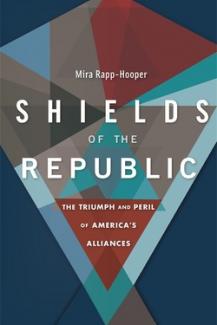Event
 Shields of the Republic: The Triumph and Peril of America’s Alliances
Shields of the Republic: The Triumph and Peril of America’s Alliances
Mira Rapp-Hooper, Steven Schwarzman Senior Fellow for Asia Studies, Council on Foreign Relations

(If you are interested in joining the virtual book talk and have not received a link via one of our email lists, please email cscc-contact@sas.upenn.edu to request a link.)
For the first century and a half of its existence, the United States had just one alliance―a valuable but highly controversial military arrangement with France. Largely out of deference to George Washington’s warnings against the dangers of “entangling alliances,” subsequent American presidents did not consider entering another until the Second World War. Then everything suddenly changed. Between 1948 and 1955, U.S. leaders extended defensive security guarantees to twenty-three countries in Europe and Asia. Seventy years later, the United States had allied with thirty-seven.
In Shields of the Republic, Mira Rapp-Hooper reveals the remarkable success of America’s unprecedented system of alliances. During the Cold War, a grand strategy focused on allied defense, deterrence, and assurance helped to keep the peace at far lower material and political costs than its critics allege. When the Soviet Union collapsed, however, the United States lost the adversary the system was designed to combat. Its alliances remained without a core strategic logic, leaving them newly vulnerable.
Today the alliance system is threatened from without and within. China and Russia seek to break the United States’ alliances through conflict and nonmilitary erosion. Meanwhile, U.S. politicians and voters are increasingly skeptical of alliances’ costs and benefits and believe the United States may be better off without them. But what if the alliance system is a victim of its own quiet success? Rapp-Hooper argues that the United States’ national security requires alliances that deter and defend against military and nonmilitary conflict alike. The alliance system is past due for a post–Cold War overhaul, but it remains critical to the country’s safety and prosperity in the twenty-first century.
Mira Rapp-Hooper is the Stephen A. Schwarzman senior fellow for Asia studies at the Council on Foreign Relations. She is also a senior fellow at Yale Law School’s Paul Tsai China Center. At CFR, Dr. Rapp-Hooper’s work explores national security and strategy issues in Asia, including great power competition, alliances, nuclear issues, and territorial disputes; the implications of China’s rise for the international order; and the future of American strategy toward Asia and China.
